Missing teeth don’t have to define your smile forever. While dental implants are often considered the gold standard for tooth replacement, they’re not the only path to restoring your confidence and oral health. Whether you’re concerned about cost, surgery, or simply want to explore all your options before making a decision, understanding every alternative to dental implants can help you make the best choice for your unique situation.
At our practice, we’ve helped thousands of patients navigate these important decisions. We believe everyone deserves to understand their options fully—from traditional solutions that have worked for decades to cutting-edge technologies that are changing the game in 2025.
Key Takeaways
- Removable dentures offer an affordable, non-surgical alternative but may lack the stability of implants
- Dental bridges provide a permanent solution for single or multiple missing teeth without surgery
- Partial dentures work well when you have some healthy teeth remaining
- Implant-supported dentures combine the benefits of dentures with improved stability
- Each option has unique benefits and limitations that should be carefully considered with your dental team
Understanding Your Tooth Replacement Options
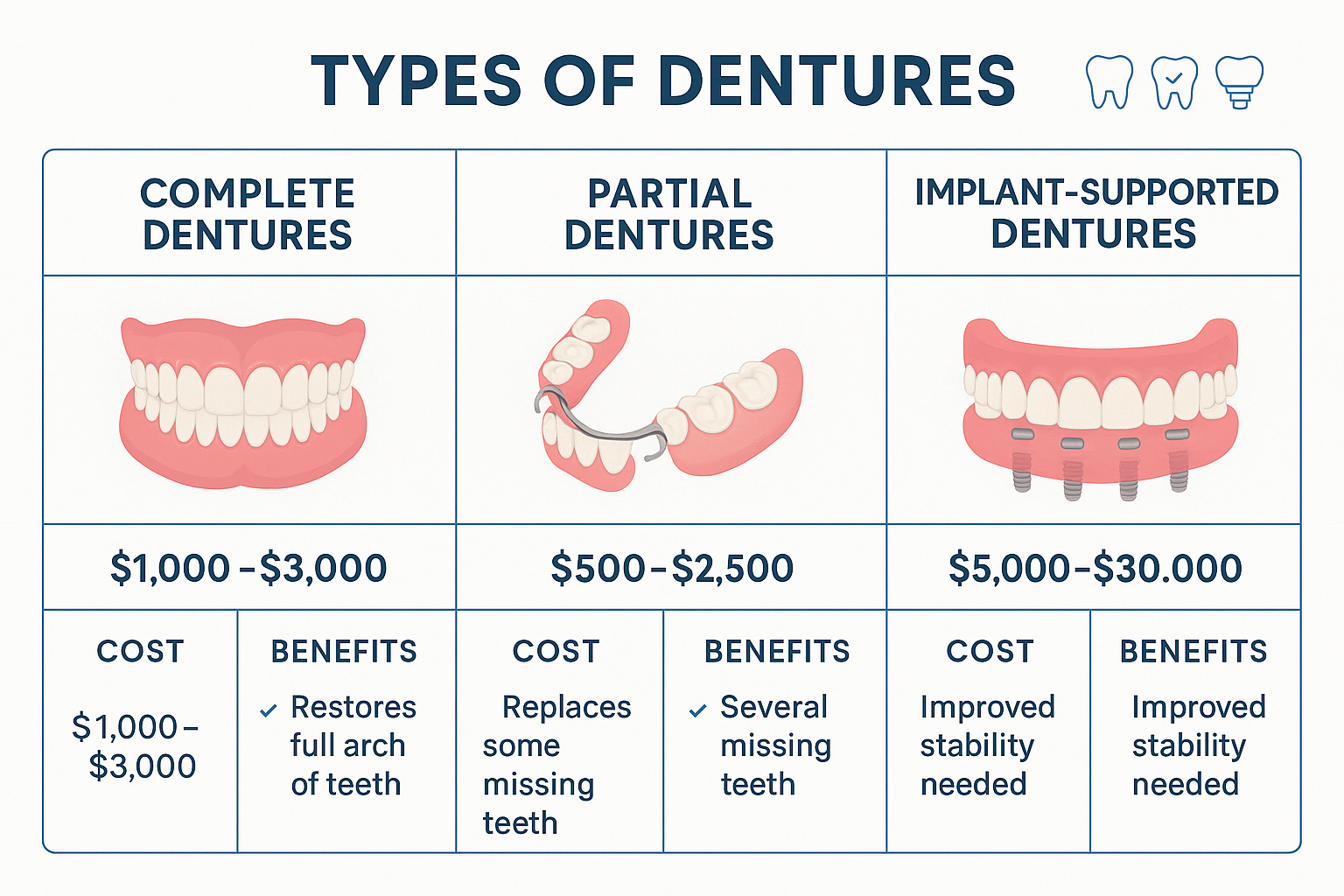
When you’re facing tooth loss, the choice of replacement method affects not just your appearance, but your ability to eat, speak, and feel confident in social situations. Let’s explore each alternative to dental implants in detail, so you can make an informed decision that fits your lifestyle and budget.
Traditional Removable Dentures
Complete dentures remain one of the most popular alternatives to dental implants, especially for patients missing most or all of their teeth. These removable prosthetic devices have been helping people restore their smiles for generations.
How They Work: Complete dentures rest directly on your gums and are held in place through suction and dental adhesives. Modern dentures are crafted from high-quality materials that look remarkably natural.
Benefits:
- Most affordable tooth replacement option
- No surgery required
- Can be adjusted or repaired easily
- Immediate solution after tooth extraction
- Covers extensive tooth loss effectively
Considerations:
- May feel bulky initially
- Require daily removal for cleaning
- Can slip during eating or speaking
- May need periodic adjustments as your mouth changes
- Bone loss continues without tooth roots
Best For: Patients seeking an economical, non-surgical solution who are comfortable with removable appliances.
Dental Bridges: A Permanent Alternative
Dental bridges offer a fixed alternative to dental implants that doesn’t require surgery. This time-tested solution literally “bridges” the gap left by missing teeth.
How They Work: A bridge consists of one or more artificial teeth (pontics) anchored to crowns placed on adjacent healthy teeth. The entire structure is permanently cemented in place.
Types of Bridges:
- Traditional bridges: Use adjacent teeth as anchors
- Cantilever bridges: Anchored to teeth on one side only
- Maryland bridges: Use metal or porcelain wings bonded to adjacent teeth
Benefits:
- Permanent, non-removable solution
- Natural appearance and function
- No surgery required
- Prevents adjacent teeth from shifting
- Maintains facial structure
Considerations:
- Requires modification of healthy adjacent teeth
- More expensive than dentures
- May need replacement after 10-15 years
- Cleaning requires special techniques
Learn more about what dental implants look like compared to bridges to help visualize your options.
Partial Dentures: When You Have Healthy Teeth Remaining
Partial dentures serve as an excellent alternative to dental implants when you still have some healthy natural teeth. These removable appliances fill in the gaps while preserving your existing teeth.
How They Work: Partial dentures use clasps or precision attachments to anchor to your remaining teeth, providing stability while replacing missing teeth.
Types:
- Acrylic partial dentures: Most economical option
- Metal framework partials: More durable and comfortable
- Flexible partial dentures: Made from thermoplastic materials
Benefits:
- Less expensive than implants or bridges
- Preserves remaining healthy teeth
- Removable for easy cleaning
- Can be adjusted as your mouth changes
- No surgery required
Considerations:
- May feel less secure than fixed options
- Requires daily removal and cleaning
- Can put stress on anchor teeth
- May affect speech initially
Implant-Supported Dentures: The Best of Both Worlds
For patients seeking more stability than traditional dentures but wanting to avoid individual implants for each missing tooth, implant-supported dentures offer an innovative compromise.
How They Work: A few strategically placed implants support a full denture, providing dramatically improved stability and function compared to traditional dentures.
Benefits:
- Much more stable than traditional dentures
- Improved chewing ability
- Prevents bone loss where implants are placed
- Can often be done with fewer implants than individual tooth replacement
- May be removable or fixed depending on design
Considerations:
- Requires surgery for implant placement
- More expensive than traditional dentures
- Healing time needed after implant placement
- Not suitable for all patients
If you’re considering this option, understanding the dental implant healing stages can help you prepare for the process.
Advanced Alternatives and Emerging Technologies
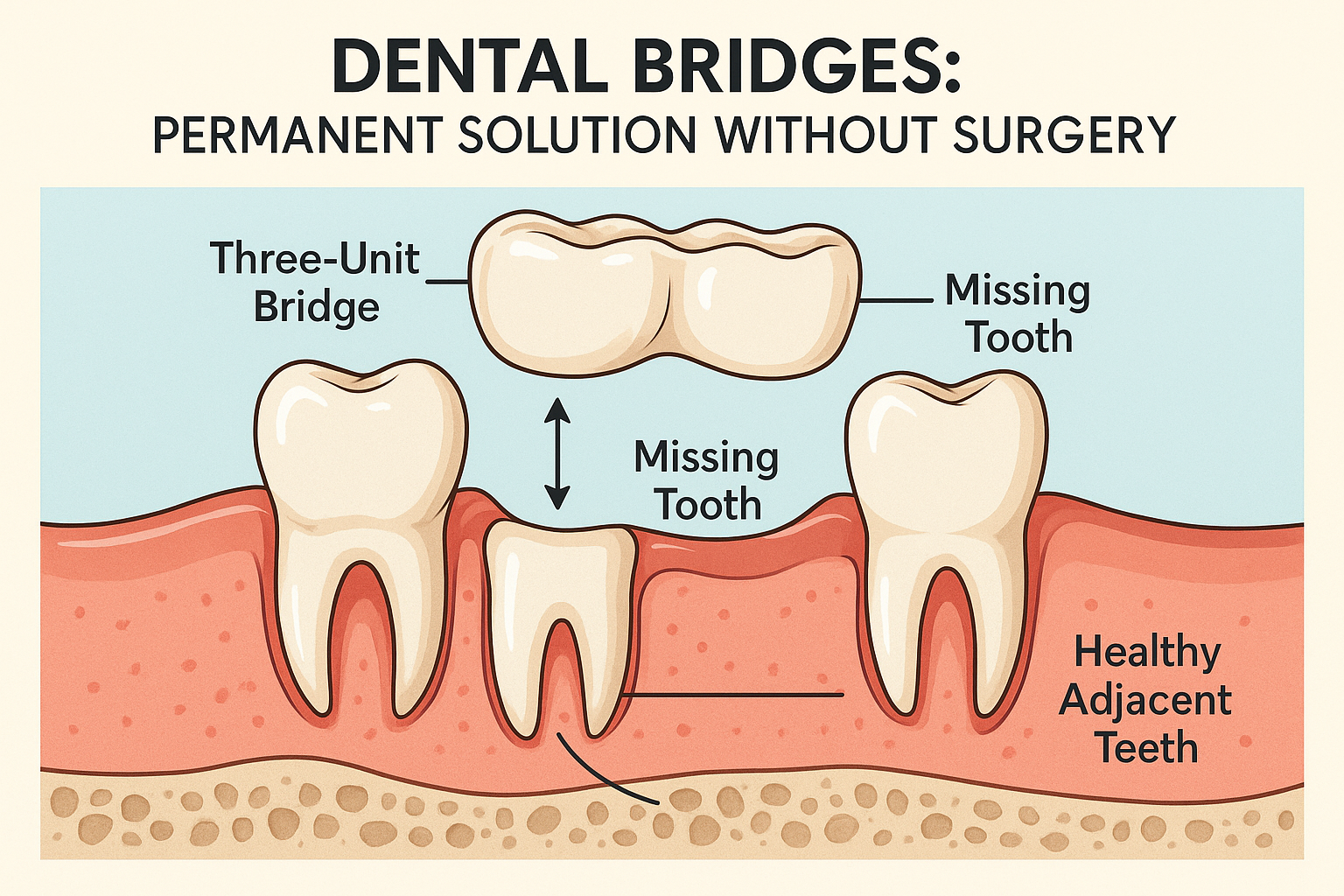
Resin-Bonded Bridges (Maryland Bridges)
These conservative bridges require minimal preparation of adjacent teeth, making them an attractive alternative for younger patients or those wanting to preserve tooth structure.
Benefits:
- Minimal tooth preparation required
- Reversible procedure
- Cost-effective
- Quick treatment time
Limitations:
- Not suitable for all locations in the mouth
- May debond and require replacement
- Limited to single tooth replacement in most cases
Flipper Dentures: Temporary Solutions
Flipper dentures serve as temporary alternatives while you decide on permanent treatment or heal from extractions.
Best For:
- Immediate tooth replacement after extraction
- Temporary solution while planning permanent treatment
- Patients needing time to save for preferred treatment
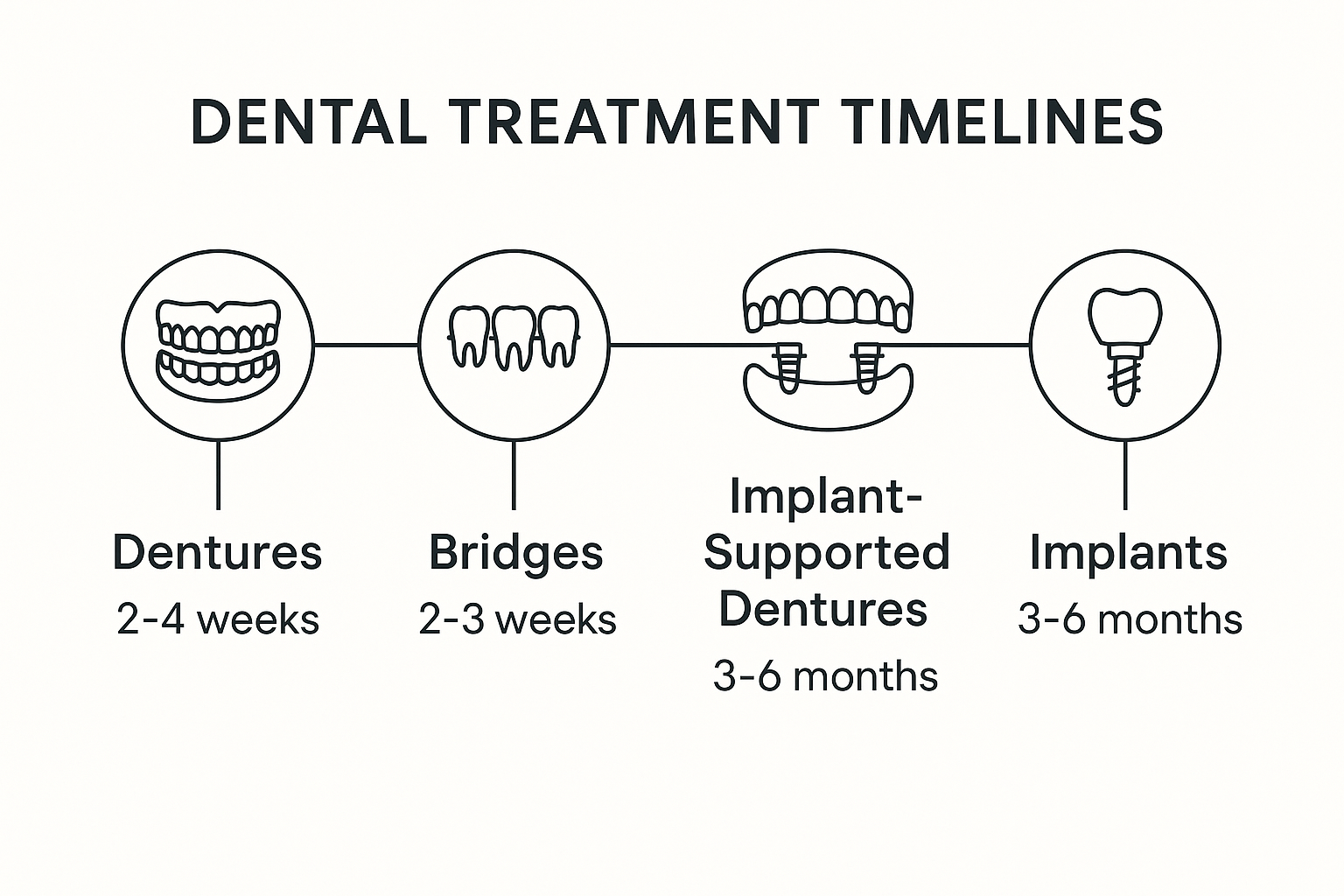
🦷 Dental Replacement Options Comparison Tool
| Treatment Option | Cost Range | Surgery Required | Type | Duration | Best For |
|---|---|---|---|---|---|
| Complete Dentures | $1,000 – $3,000 | No | Removable | 2-4 weeks | Multiple missing teeth, budget-conscious |
| Dental Bridge | $3,000 – $5,000 | No | Fixed | 2-3 weeks | 1-3 missing teeth with healthy adjacent teeth |
| Partial Dentures | $700 – $2,500 | No | Removable | 2-4 weeks | Several missing teeth with healthy teeth remaining |
| Implant-Supported Dentures | $15,000 – $30,000 | Yes | Removable/Fixed | 3-6 months | Full arch replacement with better stability |
| Maryland Bridge | $1,500 – $3,000 | No | Fixed | 2-3 weeks | Single front tooth replacement |
| Flipper Denture | $300 – $800 | No | Removable | 1-2 weeks | Temporary solution, immediate replacement |
| Dental Implants | $3,000 – $6,000 per tooth | Yes | Fixed | 3-6 months | Long-term solution, optimal function |

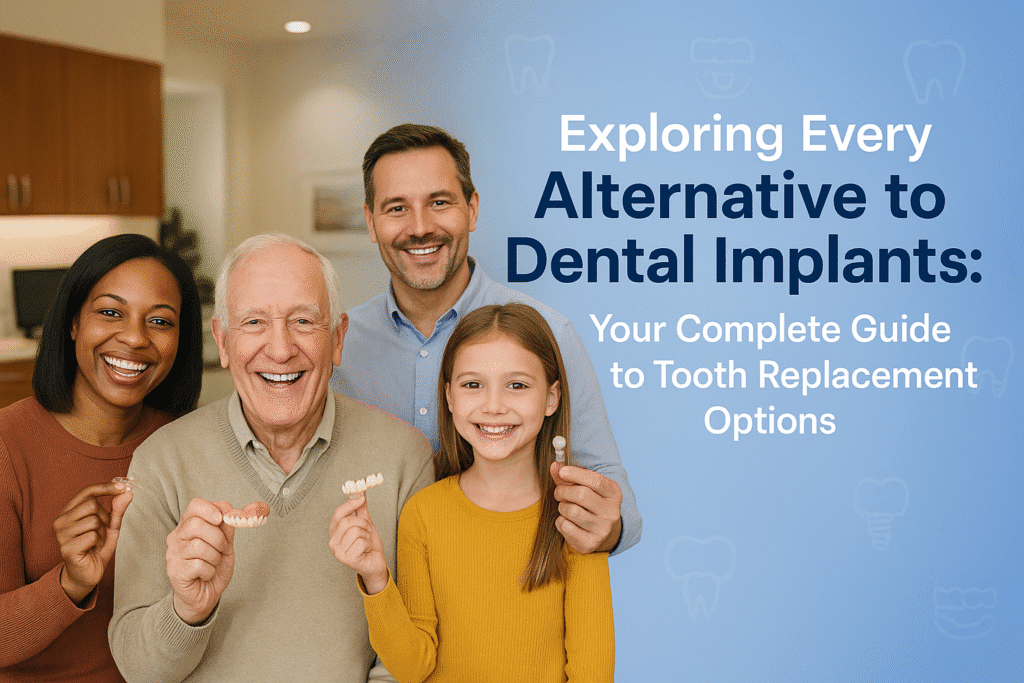

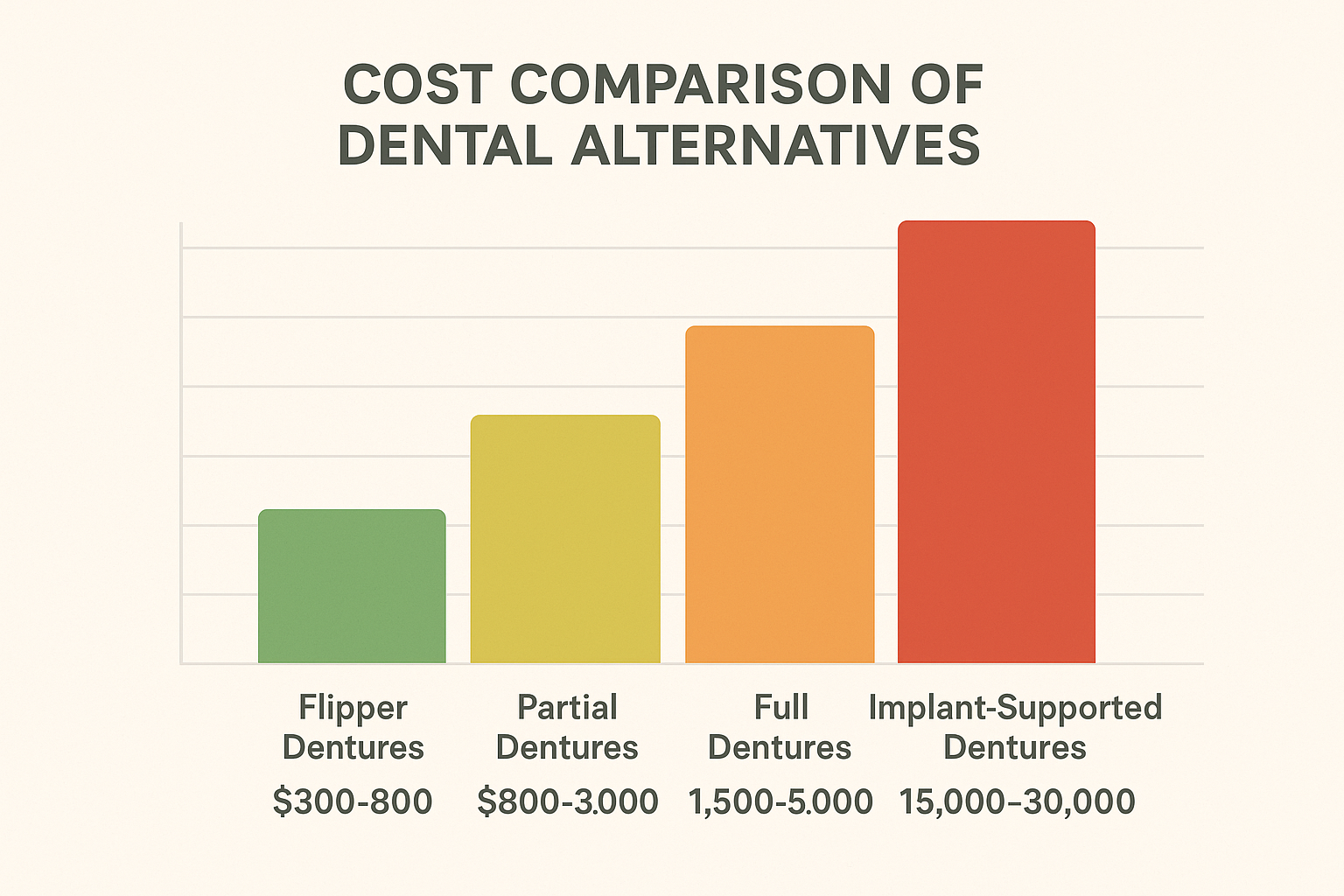
Leave a Reply
Share your thoughts or ask a question about dental implants. Your email address will not be published.